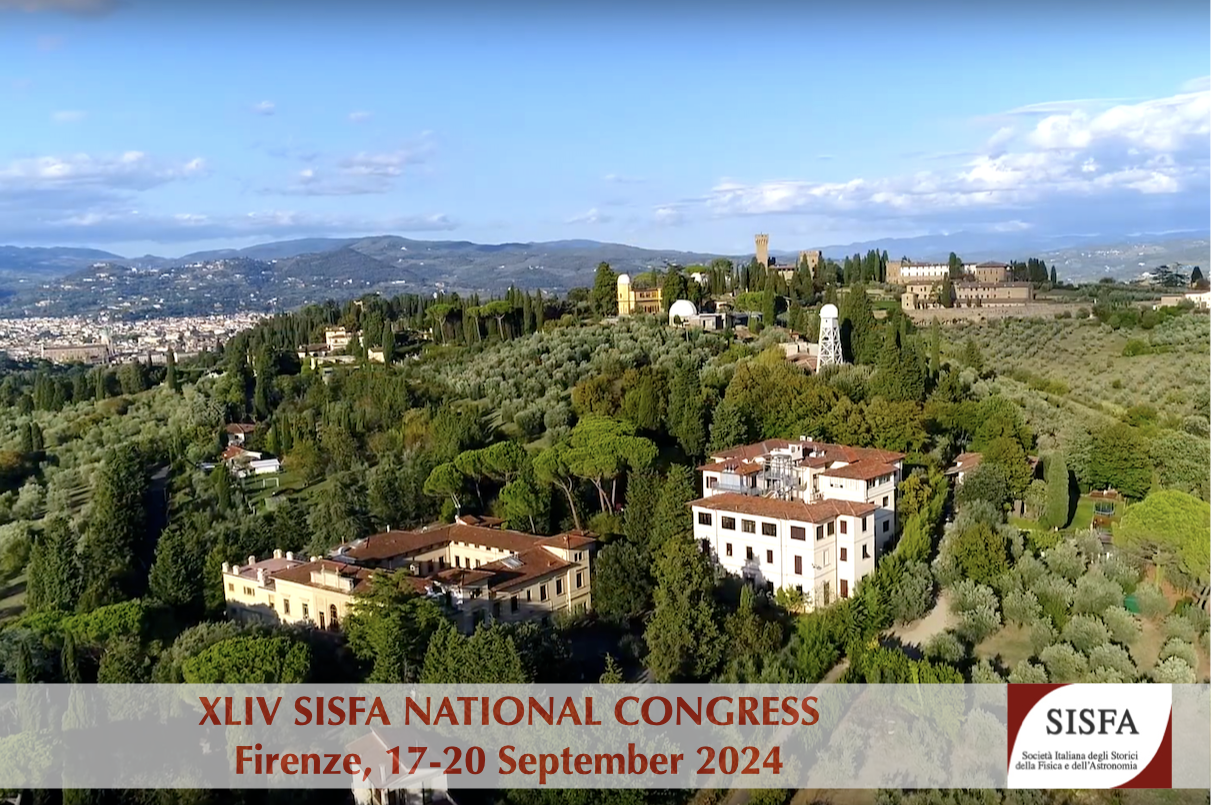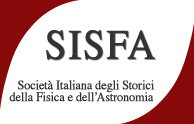
XLIV National Congress of the Italian Society for the History of Physics and Astronomy
The 44th National Congress of the Italian Society for the History of Physics and Astronomy will take place in Florence on 17-20 September 2024.
The main venue will be the Department of Physics and Astronomy (Garbasso building in Arcetri) of the University of Florence and the INAF - Arcetri Astrophysical Observatory.
The Congress
The Congress is one of a well-established series that SISFA has been organizing yearly since its foundation. It aims at promoting research activities in the history of physics and astronomy in Italy, carried out not only by academic historians but also by independent scholars and school teachers willing to explore the role of the history of physics and astronomy in the present-day teaching of the disciplines. At the same time, the Congress provides an opportunity to strengthen collaborations and establish new links among the members of SISFA and the members of other scholarly societies, as well as researchers working in the same and related fields.
Historians of physics and astronomy are then invited to participate and the invitation is extended to all the scholars and researchers sharing the same kind of interests.
The Congress will host both invited talks and oral communications. The official languages will be both Italian and English.
The SISFA award for the Best Graduate Thesis in History of Physics or History of Astronomy (Premio di Laurea SISFA2024) will be awarded during the Congress.
Topics
Proposals for oral communications should mainly address the history of physics and astronomy, also in connection with the related areas of mathematics, chemistry, and the history of science and culture. Studies focusing on historical instruments and documentary sources regarding the mentioned fields are also relevant to the purposes of the Congress, as well as the applications of the history of physics and astronomy in science education and museum displays.
Special events and thematic sessions:
From Information to Artificial Intelligence: More Than 100 Years of Communication and Computation / Dall’informazione all’intelligenza artificiale: oltre 100 anni di comunicazione e computazione - One hundred and fifty years ago Guglielmo Marconi was born. His discoveries led to the development of long-distance telecommunications. Fifty years later Harry Nyquist published his ideas on the "transmission of intelligence by telegraph". Though used differently from today, the term "intelligence" contained critical insights, and scholars have gradually clarified the distinction between intelligence, information and communication. This session will discuss the origins of information and communication theory and its evolution to cybernetics and artificial intelligence.
From Quantum Statistics to Condensed Matter Physics / Dalla Statistica Quantistica alla Fisica della Materia Condensata - In celebration of the centenary of Bose-Einstein statistics, this session will host papers dedicated to the history of quantum statistical mechanics, solid-state physics, and condensed matter physics throughout the 20th century.
1924–2024: Edwin Hubble and the Evolution of Modern Cosmology / Edwin Hubble e la Nascita della Cosmologia Moderna - In 1923, Edwin Hubble, thanks to the discovery of Classic Cepheids in the Andromeda galaxy (M31), demonstrated that the Andromeda nebula was not part of our Galaxy but was located approximately two million light-years away from us. This discovery of island universes paved the way for measuring the expansion of the Universe, understanding cosmic distances, and modern cosmology/astrophysics.
100 Years since the Birth of the University of Florence / 100 Anni dalla Nascita dell’Università di Firenze.
In Memory of Giuseppe Occhialini / In Ricordo di Beppo Occhialini Giuseppe - Occhialini (1907-1993) was one of the first students to achieve a degree in Physics (1929) at the University of Florence, whose establishment marks the centenary this year. His research in particle physics, cosmic ray physics and space physics brought him to the forefront of 20th-century Italian physics.
Museums, Archives, and Scientific Collections of Physics and Astronomy in Italy and Abroad / Musei, Archivi e collezioni scientifiche di fisica e astronomia in Italia e nel mondo - The historical collections of instruments and documents testify to scientific progress, and they are still resources for teaching and research. This session will give space to Italian and foreign historical collections
Dialogue Between History, Teaching and Dissemination in Physics and Astronomy / Dialogo tra storia, didattica e divulgazione in fisica e astronomia - This session will focus on the connections between science education, public engagement and the history of physics and astronomy.
Registration and abstract submission
The conference is open to both members and non-members, but non-members who have never attended a SISFA conference should also submit their CV to congresso@sisfa.org
To attend the conference it is necessary to be registered. Registration will be open after the acceptance of abstracts. Non-invited speakers have to finalize the registration after paying the conference fee. The conference fee will include lunches and coffee breaks and will be used to partially cover the cost of the publication of the proceedings of the conference that will be published online and open access by FedOAPress.
Titles and abstracts of oral communications should be submitted in English. The length of the abstract should be between 100 and 250 words and include no bibliography. All abstracts will be peer-reviewed on behalf of the SISFA scientific committee.
Important Note
To submit an abstract, please use your INDICO or IDEM account. If you do not have one, request it on https://indico.ict.inaf.it/login by writing: For the SISFA Congress in the form webpage. It will be quickly activated.
Per inviare un abstract, usa il tuo account INDICO o IDEM. Se ne fossi sprovvisto, richiedilo su https://indico.ict.inaf.it/login scrivendo nell'apposito modulo: Per il congresso SISFA. Ti sarà attivato rapidamente.

